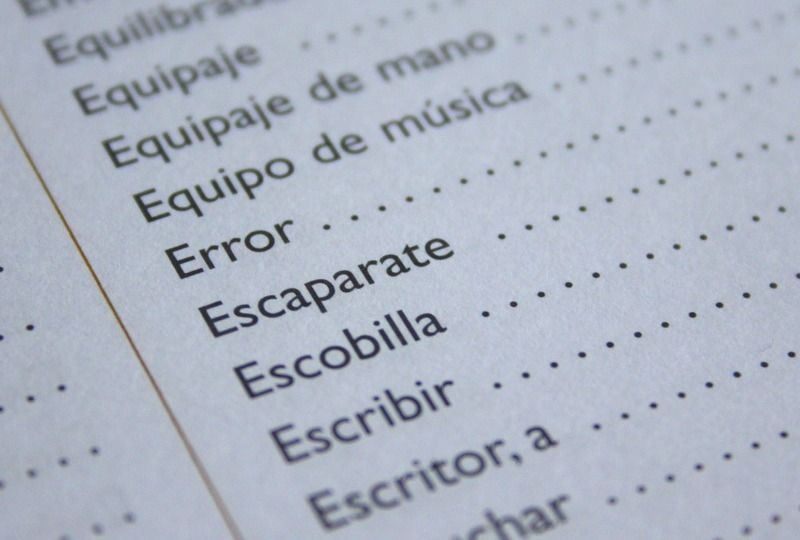A Guide to Spanish False Cognates (False Friends)

Are you looking to speak Spanish with more confidence? If so, understanding the nuances of Spanish grammar, including false cognates, is crucial. False friends in Spanish can trip up even the most advanced learners and can ultimately lead to misunderstandings and miscommunications. In this article, we’ll explore the concept of false friends in Spanish and provide guidance on using the correct words to enhance your Spanish proficiency and grammar. Whether you’re just getting started with your language learning journey or have been studying Spanish for years, mastering these linguistic concepts will elevate your fluency and increase your confidence when speaking Spanish!

What are False Friends in Spanish?
False friends are words in Spanish that may appear to be similar to words in English or other languages but have different meanings. Any combination of languages can have false friends, but here, we’ll talk about the ones between English and Spanish. These words can be tricky and, in some cases, can lead to embarrassing misunderstandings if not used correctly.
The most commonly cited false friend in Spanish is the word “embarazada”. On first glance, English speakers might take it to mean “embarrassed” when it actually means “pregnant”. Imagine trying to tell someone that you’re embarrassed and accidentally saying that you’re pregnant! Another common example is the Spanish word “sopa”. It looks like the English word for “soap”. However, “sopa” means “soup”. If you tried to ask for soap (jabón) and accidentally asked for sopa, you might be a little embarassed!
Another thing to watch out for are words that are similar in Spanish. They may not be false friends, per say, but it can be easy to select the wrong word. For example, I once used the word cafetería (cafeteria) instead of cafetera (coffee maker). Cafetería and cafeteria are cognates. They look the same and have the same meaning, but the words cafetería and cafetera are quite similar, leading to my mix up.
Another example that I’ve struggled with are jabón (soap) and jamón (ham). None of those words are false friends or cognates, but their similar spelling in Spanish is sometimes enough to confuse language learners. The best thing you can do is take your time in the learning process when it comes to accurate vocabulary. It’s also a good thing to be open to making mistakes. Every time I’ve made a mistake in Spanish, people have been willing to work with me and have been supportive and helpful. Making mistakes is part of the journey when learning Spanish.

Examples of False Friends
Understanding common false friends in Spanish is essential for mastering the language and avoiding communication mishaps. Although mistakes are part of learning, let’s review some of the common false friends so we are as prepared as possible. I’ll provide a list of common false friends in Spanish, their meanings in English, and how to say the word they are mistaken for in Spanish.
—Actual: In Spanish this means current or present. To say actual in Spanish, use real or verdadero.
—Asistir: In Spanish this means to attend. To say to assist, use ayudar.
—Bizarro: In Spanish, this means brave or gallant. To say bizarre in Spanish, use extraño or raro.
—Conductor: In Spanish, this means driver or someone who operates a vehicle. To talk about the conductor of an orquestra, use director de orquesta.
—Éxito: In Spanish, this means success. To refer to an exit in Spanish, use salida.
—Grosería: In Spanish, this means rudeness or insult. To refer to a grocery store, use supermercado.
—Introducir: In Spanish, this means to insert or to put in. To say to introduce, use the word presentar.
—Librería: In Spanish, this means bookstore. To refer to a library, use the word biblioteca.
Familiarizing yourself with these examples will enhance your language skills and help you avoid potential misunderstandings. Keep practicing to improve your fluency and confidence in Spanish communication.

Safe Cognates and How to Recognize Them
Recognizing cognates can be a game-changer and instantly increase your Spanish vocabulary. Cognates are words that have similar forms and meanings in two languages, making them easy to remember because they are already familiar to you. Here are some basic rules that can help you identify cognates in Spanish:
—Similar Spelling: Many cognates have similar spellings in the two languages in question. Take, for example, the word información which looks like the English information.
—Common Roots: Cognates usually share the same root, such as Latin or Greek. For example, the Spanish word nación and the English word nation both have the same Latin root natio.
—Suffixes and Prefixes: Pay attention to suffixes and prefixes that can indicate cognates. For example, activo in Spanish and active in English share the suffix -ive.
—Recognizable Words: Some cognates are easy to recognize simply because they are identical or very similar. The word doctor is used in both English and Spanish, for example.
Here are some common endings to look out for that can help you:
—ción: Usually corresponds to -tion or -sion in English, such as with información (information), educación (education), or fusión (fusion).
—dad: Often corresponds to -ity in English, such as with universidad (university) and comunidad (community).
—al: Often corresponds to -al in English, such as with nacional (national) and regional (regional).
—ente: Usually corresponds to -ent or -ant in English, as with excelente (excellent) and importante (important).
—ismo: Often corresponds to -ism in English, as with turismo (tourism) and capitalismo (capitalism).
—ista: Often corresponds to -ist in English, such as with artista (artist) and optimista (optimist).
—mente: Often corresponds to -ly in English and indicates adverbs, such as with fácilmente (easily) and rápidamente (quickly).
Perfect cognates are special words that have identical spelling and meaning in both languages. Examples in Spanish include animal, hotel, and color. Words like this are great vocabulary boosters. Embrace these linguistic similarities and use them to your advantage.

Practice
Let’s put your knowledge to the test. Look at this list of words and try to pick out the false friends and identify the cognates. Scroll down a little to see if the words are cognates or false friends in Spanish and to review the meanings of each word once you’re ready.
- Completo
- Recordar
- Ropa
- Artificial
- Familiar
- Realizar
- Universal
- Diferente
- Interesante
- Nacionalidad
Below are the meanings of the words. How many did you get right?
- Completo — Cognate — Complete
- Recordar — False Friend — To remember
- Ropa — False Friend — Clothing
- Artificial — Cognate — Artificial
- Familiar — Cognate — Familiar
- Realizar — False Friend — To do or complete
- Universal — Cognate — Universal
- Diferente — Cognate — Different
- Interesante — Cognate — Interesting
- Nacionalidad — Cognate — Nationality

Be Careful with False Friends!
As you continue to practice Spanish and expand your language skills, remember to keep an eye out for false friends. They’re not always easy to spot. These words can be deceptive and lead to embarrassing misunderstandings and hinder effective communication. By mastering the differences between false friends and cognates, you can enhance your proficiency and confidence when speaking Spanish. To continue learning, practice Spanish regularly and don’t hesitate to seek clarification when you’re unsure about a word’s meaning. With dedication and perseverance, you’ll find your way and navigate the complexities of Spanish grammar and vocabulary with time. Keep learning, keep practicing, and remember the progress you’ve already made.